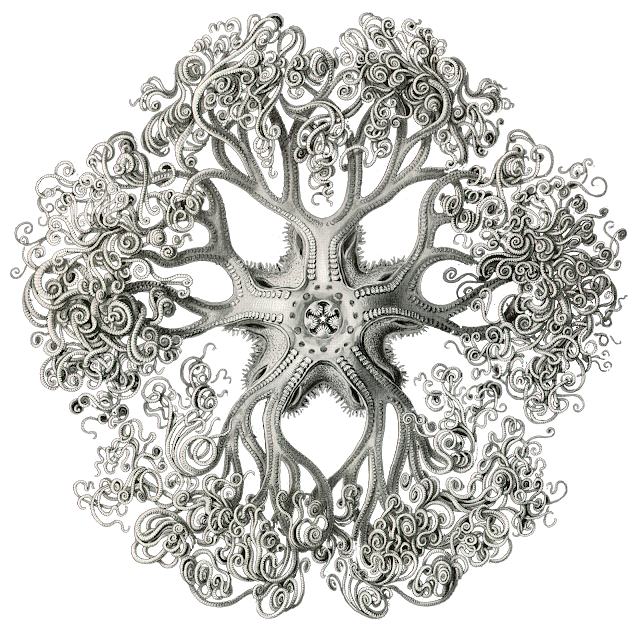Psalms for the Common Life
 |
| (Ernst Haeckel, illustration) |
Here are a few psalms that I read this morning in preparation for my course on worship and the arts. Each in their own peculiar way does what every good psalm must do: make the strange, familiar, and the familiar, strange. Each is written by somebody we might least suspect would ever have any interest in penning a "psalm." With each, I am invited, like the biblical psalmist, to perceive the grace of God in the common places of our lives where we might, desperately in fact, wish to find it. (I've placed in brackets the biblical psalm likely evoked by the poem.)
Psalm III, by Allen Ginsberg (1926-1997)
[Psalm 27:1]
To God: to illuminate all men. Beginning with Skid Road.
Let Occidental and Washington be transformed into a higher place, the plaza of eternity.
Illuminate the welders in shipyards with the brilliance of their torches.
Let the crane operator lift up his arm for joy.
Let elevators creak and speak, ascending and descending in awe.
Let the mercy of the flower’s direction beckon in the eye.
Let the straight flower bespeak its purpose in straightness — to seek the light.
Let the crooked flower bespeak its purpose in crookedness — to seek the light.
Let the crookedness and straightness bespeak the light.
Let Puget Sound be a blast of light.
I feed on your Name like a cockroach on a crumb — this cockroach is holy.
Taste and See, by Denise Levertov (1923-1997)
[Psalm 34:8]
The world is
not with us enough
O taste and see
the subway Bible poster said,
meaning The Lord, meaning
if anything all that lives
to the imagination’s tongue,
grief, mercy, language,
tangerine, weather, to
breathe them, bite,
savor, chew, swallow, transform
into our flesh our
deaths, crossing the street, plum, quince,
living in the orchard and being
hungry, and plucking
the fruit.
Te Deum, by Charles Reznikoff (1894-1976)
[Psalm 98:1]
Not because of victories
I sing,
having none,
but for the common sunshine,
the breeze,
the largess of the spring.
Not for victory
but for the day’s work done
as well as I was able;
not for a seat upon the dais
but at the common table.
"The Sleep," by Elizabeth Barrett Browning (1806-1861)
[Psalm 127:2]
Of all the thoughts of God that are
Borne inward into souls afar,
Along the Psalmist’s music deep,
Now tell me if that any is
For gift or grace surpassing this—
“He giveth His beloved, sleep”?
What would we give to our beloved?
The hero’s heart to be unmoved,
The poet’s star-tun’d harp to sweep,
The patriot’s voice to teach and rouse,
The monarch’s crown to light the brows?—
He giveth His beloved, sleep.
What do we give to our beloved?
A little faith all undisproved,
A little dust to overweep,
And bitter memories to make
The whole earth blasted for our sake:
He giveth His beloved, sleep.
“Sleep soft, beloved!” we sometimes say
Who have no tune to charm away
Sad dreams that through the eyelids creep:
But never doleful dream again
Shall break the happy slumber when
He giveth His beloved, sleep.
O earth, so full of dreary noises!
O men, with wailing in your voices!
O delved gold, the wailers heap!
O strife, O curse, that o’er it fall!
God strikes a silence through you all,
And giveth His beloved, sleep.
His dews drop mutely on the hill,
His cloud above it saileth still,
Though on its slope men sow and reap:
More softly than the dew is shed,
Or cloud is floated overhead,
He giveth His beloved, sleep.
Ay, men may wonder while they scan
A living, thinking, feeling man
Confirm’d in such a rest to keep;
But angels say, and through the word
I think their happy smile is heard—
“He giveth His beloved, sleep.”
For me, my heart that erst did go
Most like a tired child at a show,
That sees through tears the mummers leap,
Would now its wearied vision close,
Would childlike on His love repose
Who giveth His beloved, sleep.
And friends, dear friends, when it shall be
That this low breath is gone from me,
And round my bier ye come to weep,
Let One, most loving of you all,
Say, “Not a tear must o’er her fall!
He giveth His beloved, sleep.”
 |
| Henry Peach Robinson "When the Day's Work is Done" (1877) |


Comments